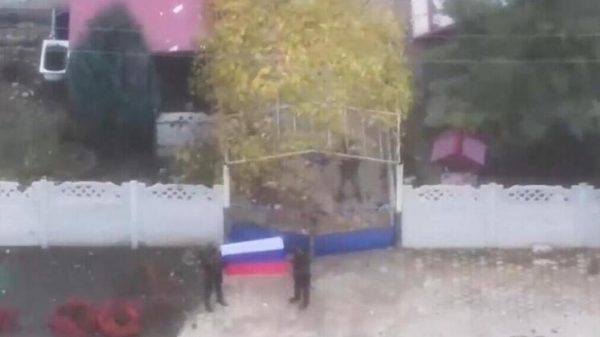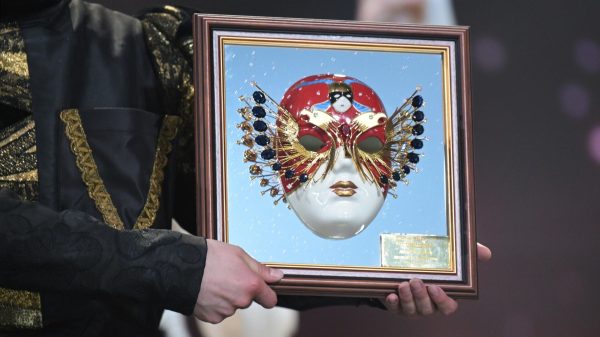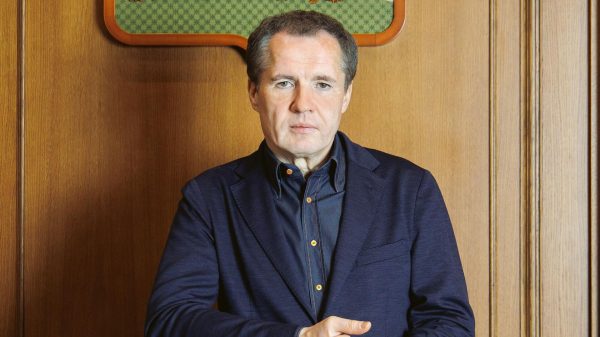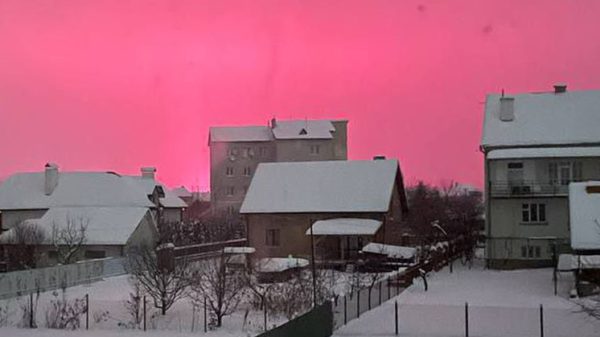 Colin Baker as Doctor Who, hero of the single «Doctor in Trouble» Photo: BBC
Colin Baker as Doctor Who, hero of the single «Doctor in Trouble» Photo: BBC
New Netflix documentary with an optimistic title » Pop's Biggest Night sheds new light on the making of We Are The World, an American charity record released in March 1985 on the heels of Do They Know It's Christmas? Band Aid. But that same month, another charity protest record was released, featuring a group of singing celebrities gathered in a recording studio. You won't believe what I'm about to tell you. But I guarantee that all this is true.
In February 1985, The Sun's front page screamed: «DOCTOR WHO RUINED BBC PLOT.» The decision to kill Doctor Who was made by Michael Grade, controller of BBC One, and Jonathan Powell, head of drama at the BBC. Their dislike of Doctor Who brought together these two executives with wildly disparate CVs — showman Grade, Powell, a very noble former producer of such expensive fare as Tinker Tailor Soldier Spy and The Barchester Chronicles. They canceled a series where scripts for the next episode had already been written, plans drawn up, directors hired, thus writing off thousands of money from licensing fees; an unprecedented step. They really hated it.
The main problem with Doctor Who at the time (which less hostile executives might have noticed and corrected) was not its tiny budget; after all, it was very popular for many years, despite its wobbly sets and wonky monsters. The problem was in the scripts. After Tom Baker's apparent excesses in the role, producer John Nathan-Turner turned the volume down on the title character along with Peter Davison and then turned it up again — up, up, up! – with his successor Colin Baker. Both are fine actors who have been very poorly served. But if you take away the endearingly irreverent nature of Doctor Who himself and make him first polite and then rude, you're left with a creaky, crude and very cheap-looking children's sci-fi show.
 Doctor in Trouble mastermind John Nathan-Turner Photo: Monitor Press Features Limited
Doctor in Trouble mastermind John Nathan-Turner Photo: Monitor Press Features Limited
Here we must stop and focus on John Nathan-Turner, known to everyone at the BBC as JNT. (Michael Grade, oddly enough, thought his name was Jay Anthy.) He was a very interesting character, with a full beard and a spectacular mop of glossy curls. He enjoyed the attention that Doctor Who fans gave him — he loved to fly to American Doctor Who conventions and became famous there for wearing colorful Hawaiian shirts and using catchphrases such as «stay tuned» or «I'm surprised and delighted.» This was very unusual behavior for a television producer.
Going undercover — even more unusual behavior — JNT leaked news of the dismissal to the tabloids. The resulting press storm forced Grade and Powell to back down, releasing a statement that Doctor Who would return for another series at a later date.
Then came JNT's strangest move yet. His life partner and temporary manager at Doctor Who, Gary Downey, inspired by Band Aid and, one might assume, a barrel of BBC vin ordinaire, came up with the idea for a charity pop record demanding the Doctor's return absolutely immediately. WHO. The first thought that comes to anyone's mind when they hear about this—that a small delay in the production of a TV show pales in comparison to the famine in Ethiopia—seems to have never occurred to either JNT or Downey.
 Doctor in Trouble Cover
Doctor in Trouble Cover
Enter another pyrotechnic character. This is DJ and producer Ian Levine, an ardent Whovian apostle and friend of JNT and Downey at the time. He was then, and still is, a very short-tempered guy, constantly on the edge of fear that what he loved — Doctor Who — would be taken away or slandered. At the time, Levine was well known in the dance music scene, writing, producing and remixing international hits such as Evelyn Thomas's «High Energy» as well as a host of equally bombastic electronic songs in the genre formerly known as «gay disco» » or Boystown. which became Hi-NRG.
It was sort of a powerful retooling of disco, with the streamlined, funky female vibe reduced and the endless repetitive bash-bash-bash/release of male sexuality enhanced. Hi-NRG is never subtle—but even for the genre, Levine's work (celebrated by titles like «So Many Men,» «Such Little Time» and «The Boys Come To Town») is outrageously hot.
In short order, Levine wrote «Doctor in Trouble» and created the backing track (in another incredible moment, he had help from Hans Zimmer — yes, Hans Zimmer, Oscar-winning composer of the scores for the films «The Lion King» and «The Rain»). Man and Dune).
There is another oddity here. “Do They Know It’s Christmas” is a peculiar, mournful song with African drums and a synth line that strangely sounds like the middle eight of the Doctor Who theme. We Are The World is a sickly mess of twisted 1970s soul. They are both strangely timeless. But «Doctor in Trouble» sounds modern; everything about it screams March 1985, all pounding Linn drums and dissonant synth beats. It rattles, clangs, and rattles—it sounds like someone on the assembly line had a poppers-induced heart attack.

Now it's time for celebrities to add their magic by uniting under the banner of Who Cares. (I'll leave you here to make a joke.) Initial media reports suggested that Elton John and members of Frankie Goes To Hollywood — then a hugely popular group — were lined up.
But Who Cares instead featured a motley constellation of much dimmer stars, including Sally Thomsett (the third lead on the 1970s sitcom Man About the House), Dollar's David van Day, Bucks Fizz's Bobby , gay club doyenne Hazell Dean and Rick. Buckler, former drummer for The Jam. Justin Hayward of The Moody Blues sounds ashamed, although he could. There's a moment when you think Dolly Parton has taken a solo line, but it's actually impressionist Faith Brown.
Now we come to the texts. After a mass chorale of «Eighteen months is too long to wait, bring back the Doctor, no doubt!», we get a corny Doctor Who story spoken by celebrities, as well as Colin Baker and his co-star Nicola. Bryant. The words are very strong when it comes to “The Doctor” and his “companions,” as fans call Doctor Who and his assistants. If anyone ever corrects you on this, that's a reason to run as hard as you can.
 Doctor in Distress vocalist Sally Thomsett Photo: ANL/Shutterstock
Doctor in Distress vocalist Sally Thomsett Photo: ANL/Shutterstock
We learn that Doctor Who is “a legend that no one else can replace.” In 1985, no one thought about it — it was just a tacky old TV show that only nerds liked (ironically, a position it has returned to now, forty years later). We hear that the show's characters, when faced with danger, «didn't run away, didn't hide» — although this has always been the case. Another highlight is the line «Every screaming girl just hoped the Yeti wouldn't shoot her» — the words themselves are recognizable, but have certainly never been placed in that order before or since.
American diva Phyllis Nelson, shortly after the soul ballad Move Closer became a hit and whose voice could swallow up any faint trill in that studio, screams: “No, no, no, NO!” as if the universe was about to explode.
This was all filmed on camera by more sympathetic Doctor Who fans. Unfortunately, they forgot to turn on said camera's color switch and videotaped the incident in blurry black and white. This was corrected by toning and compressing the footage down to a tiny square, which was then superimposed over standard space-age Tron-type animation. It looks, accordingly, terrible.

Proceeds from the single went to Cancer Research, but to everyone's surprise, the company stalled and never recouped its expenses. It is not surprising that Radio 1 refused to broadcast it.
I wonder what JNT were hoping to achieve — that the record would be a hit and shame Grade and Powell into rushing Doctor Who back into production? They have already been forced to defer their punishment. JNT called himself a great master of publicity, but the reaction of most people in the 1980s to Doctor Who was: «I had no idea it was still on!»
Doctor in Trouble had only bad consequences . those. Colin Baker later revealed that he was forced to appear in it despite serious concerns about public criticism of the management. JNT kept his job on Doctor Who, with Powell later admitting: «What else was I going to do with bloody John Nathan-Turner?» But after filming the 1986 series, Baker was fired. Soon after, Ian Levine fell out with JNT and went on to have huge success with the Pet Shop Boys and Take That. He is very embarrassed by the whole affair — and you would think that he was a man who was not embarrassed.
But I still strangely like Doctor in Trouble as one of those cultural artifacts that you can't believe exists. It's kind of like an earworm. I still hum it from time to time while cleaning the lint out of the dryer. Yes, this is a strange and terrible thing. But what kind of world is this in which there are such terrible miracles?

























































Свежие комментарии